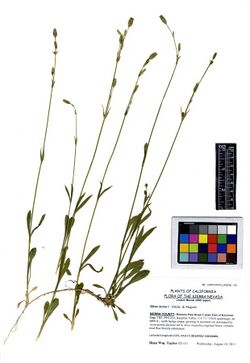Biology:Silene invisa
| Silene invisa | |
|---|---|

| |
| Herbarium specimen | |
| Scientific classification | |
| Kingdom: | Plantae |
| Clade: | Tracheophytes |
| Clade: | Angiosperms |
| Clade: | Eudicots |
| Order: | Caryophyllales |
| Family: | Caryophyllaceae |
| Genus: | Silene |
| Species: | S. invisa
|
| Binomial name | |
| Silene invisa C.L.Hitchc. & Maguire
| |
Silene invisa is a species of flowering plant in the family Caryophyllaceae known by the common names red fir catchfly[1] and short-petaled campion.
It is endemic to California , where it is known only from the southernmost Cascade Range and northernmost Sierra Nevada. It grows in the coniferous forests of the mountains.
Description
Silene invisa is a perennial herb growing up to about 40 centimeters tall from a leafy caudex and taproot. The linear or lance-shaped leaves are a few centimeters long low on the plant and smaller farther up the stem.
The inflorescence is a solitary flower or a cyme of up to three flowers at the top of the stem. Each flower has a bell-shaped calyx of fused sepals lined with ten green veins and covered in short, glandular hairs. The strap-shaped or rectangular petals have blunt tips or may be notched. They are whitish to pinkish or lavender and sometimes barely protrude from the calyx.
References
- ↑ "Silene invisa". Natural Resources Conservation Service PLANTS Database. USDA. https://plants.usda.gov/core/profile?symbol=SIIN. Retrieved 14 November 2015.
External links
- Jepson Manual Treatment of Silene invisa
- USDA Plants Profile
- Flora of North America
- UC Photos gallery: Silene invisa
Wikidata ☰ Q7514470 entry
 |

